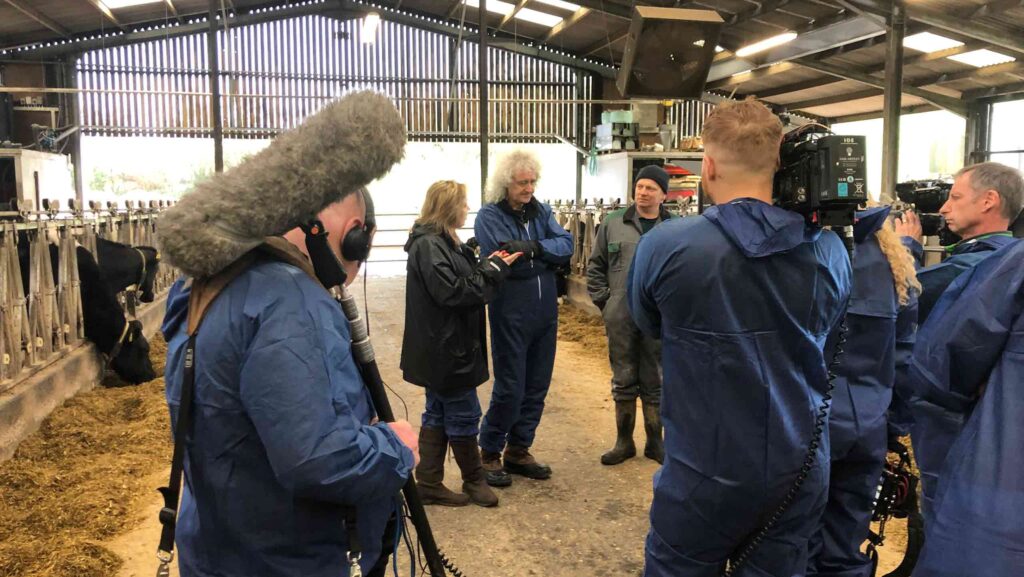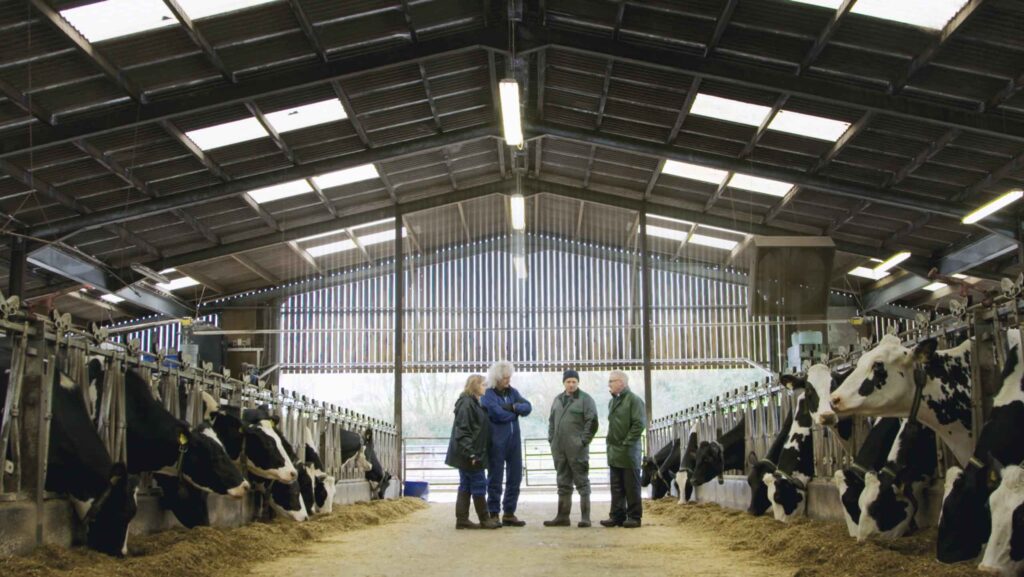Brian May – ‘Badgers are irrelevant in cattle TB spread’
 Brian May and the Save Me Trust's Anne Brummer © Save Me Trust
Brian May and the Save Me Trust's Anne Brummer © Save Me Trust Queen guitarist and animal rights campaigner Sir Brian May has staked his life on badgers playing no role in the bovine TB nightmare for farmers.
He believes badgers do not play a part in transmitting TB to cattle, and attributes disease spread primarily to flaws in cattle testing and poor farm biosecurity.
“I know it for certain. I’d stake my life on it now. I didn’t know that in the beginning. I hoped it was true, but I know it now for sure because of what we’ve seen on the ground.”
See also: Gatcombe bovine TB project to continue despite setback
He spoke to Farmers Weekly in an exclusive interview ahead of the screening of his new BBC documentary on Friday, 23 August.
Read the report and watch the video below.
In the interview he claims that badgers are a “dead-end” host and “irrelevant” in the control of bovine TB.
He asserts that on Gatcombe Farm in East Devon, where the documentary is set, infected badgers surrounded a clear herd.
Sir Brian’s stance is strongly contested by the NFU and contradicts peer-reviewed studies, including the recent Birch Review.
It found a 56% fall in bovine TB rates on average in areas of England that had four or more years of badger culling.

Brian May and Anne Brummer © Save Me Trust
‘Too many variables’
But Sir Brian, who is a fierce critic of badger culling and has campaigned against it for over 14 years, rejects these findings.
He says the studies are flawed because culling was introduced alongside changes to biosecurity and testing, so the effect of culling alone cannot be measured.
He also hit out at the whole system of peer review, alleging papers were looked at by the same “clique” of people who are interested in the subject.
“You know, it tends to be not impartial,” he told Farmers Weekly.
While no developed country in the world has managed to eradicate bovine TB without addressing the disease in wildlife, Sir Brian believes the UK can.
He dismisses suggestions that badgers need vaccination, claiming they do not transmit the disease, and believes that cattle vaccination will not be ready before 2038.
Instead, he blames the spread of TB on risks posed by slurry and the inadequacy of the skin test, which he describes as “horrifically inaccurate”.
Sir Brian also raises concerns in the documentary that some farmers are buying in infected cattle.
He says that, in addition to the limitations of the skin test, a growing hidden reservoir of undiagnosed TB is being left on farms and spreading to other animals.
In March, England recorded its lowest level of TB herd incidence in 17 years and TB cattle slaughterings have halved in the last decade to about 20,000 a year.
Despite all this, Sir Brian reckons bovine TB is getting worse, not better.
What Defra says
Defra has reiterated its commitment to ending badger culling in England, despite a recent decision to extend the current round of culling until 2026.
A Defra spokesperson acknowledged the devastating effects of bovine TB on the farming community, which has driven the government’s approach to disease management.
The spokesperson reaffirmed that the government’s TB eradication strategy will include a combination of methods such as vaccination, herd management, and enhanced biosecurity.
Gatcombe approach
In the documentary Brian May: The Badgers, The Farmers and Me, Sir Brian explores an alternative approach to managing bovine TB on Gatcombe Farm, run by farmer Robert Reed.
The one-hour programme showcases efforts by Sir Brian – along with large animal vet Dick Sibley and Anne Brummer, chief executive of the Save Me Trust – to tackle TB through enhanced testing and improved biosecurity rather than badger culling or vaccination.
Gatcombe Farm has been using a combination of repeated gamma (blood), PCR and Elisa tests to diagnose potential TB-infected cows on the farm.
Overall, between 30-40 cows that have come back as positive with enhanced testing have been voluntarily culled because they were considered high risk to the herd.
Sir Brian also reveals that a third of badgers at Gatcombe tested positive for bovine TB.
Yet he rules out the possibility of pasture being affected by badgers excreting M bovis (the bacterium which causes bovine TB) alleging they “only do excretions” in latrines.
This claim was rejected by Sarah Tomlinson, a farm vet based in Derbyshire and lead veterinary science expert at AHDB.
She has photographs of badger excrement in a calf creep feeder and pointed to other evidence showing that badgers have urinated in maize clamp silage.
The initial plan at Gatcombe included vaccinating badgers, but this was not possible until more recently due to the prioritisation of the BCG vaccine for human use.
After six consecutive years of being down with TB, the farm went clear of the disease in 2018 – before they started vaccinating badgers.
Instead, the strategy at Gatcombe focuses on reducing the risk of TB transmission via faecal contamination.
This is despite the scientific consensus indicating that bovine TB is primarily a respiratory disease, with faecal transmission being relatively rare.
However, Sir Brian and Mr Sibley believe their approach of containing the “shedding” of bacteria in faeces has effectively reduced cattle TB on the farm.
They attribute the several years of TB-free status on the farm to strict biosecurity measures.
The farm experienced a TB breakdown again in May 2023 when five cows tested positive for the disease, which the pair blame on restrictions which prevented enhanced testing while the herd was clear.
In September 2023, three further TB reactors were detected. And in November, one TB slaughterhouse case was confirmed.
These recent breakdowns are not covered in the BBC documentary.
Inaccurate testing
Current Defra policy does not permit private testing of TB-negative herds, which the Gatcombe team argue is critical for managing residual infection within herds.
Gatcombe Farm’s Robert Reed says he is confident he could eradicate TB from his herd with fewer restrictions on enhanced testing and better skin testing.
All the work at Gatcombe has been funded by Mr Reed and Mr Sibley, apart from the vaccination of badgers, which Sir Brian has funded.
Critics argue that their approach lacks scientific rigour, as it dismisses existing evidence and relies heavily on anecdotal success.
The recurrence of TB at Gatcombe Farm further complicates the narrative, suggesting that wildlife sources, including badgers, might still play a role.
Policy solutions
Asked what he would do on TB policy if he was Defra secretary, Sir Brian says he would stop culling immediately and redirect funding to more enhanced testing and improved on-farm biosecurity.
He says he is “in talks” with Defra and wants the Labour government to pilot the “Gatcombe Protocol” over a wider area.
He is confident the strategy will be successful, but says it requires a change of policy, and farmers who are prepared to try it.
“I have no doubt we are right, whatsoever,” Sir Brian told Farmers Weekly.
However, TB experts caution that Sir Brian’s theories rely on selective evidence and may not be as effective as he believes.
- Brian May: The Badgers, The Farmers and Me airs at 9pm on 23 August on BBC Two and BBC Two Wales.
TB experts have their say on Gatcombe strategy
Scientists who are involved in research on bovine TB have welcomed the Gatcombe Farm approach.
But they warned there may be flaws in conclusions drawn from one set of observations.
James Wood, a professor at Cambridge University, has carried out research on bovine TB for 15 years.
He says that how the disease manifests itself is highly variable between farms and a one-size-fits-all solution may not necessarily work effectively on every site.
“Many of the elements being proposed from Gatcombe are not a revelation, but do represent higher standards of animal husbandry,” Prof Wood says.
However, the scientific evidence at a national scale is absolutely clear that a small proportion of cattle do get infected by badgers, he adds.
“To suggest that this infection does not transmit between cattle and badgers is highly irresponsible.”
Prof Wood says it was highly misleading of the programme makers not to include the fact that the farm had gone down again with TB last year.
Sarah Tomlinson is disappointed that the programme focuses on the debate around badger culling.
She feels this is “dangerous” because of the mental health impact this will have on farmers and vets, including the Animal and Plant Health Agency and the NFU.
Both have put a lot of hard work into tackling the disease to achieve the 20-year all-time low in new TB herd breakdowns in England.
“We don’t disagree with the work they have done at Gatcombe, but you can’t dismiss 20 years of work on bovine TB,” she says.
“This is a really great case study highlighting where vets and farmers work together to reduce the risks of TB infection on their own farm.
“However, each farm has very different risk factors and these need to be taken into consideration, including the risk from wildlife.”
